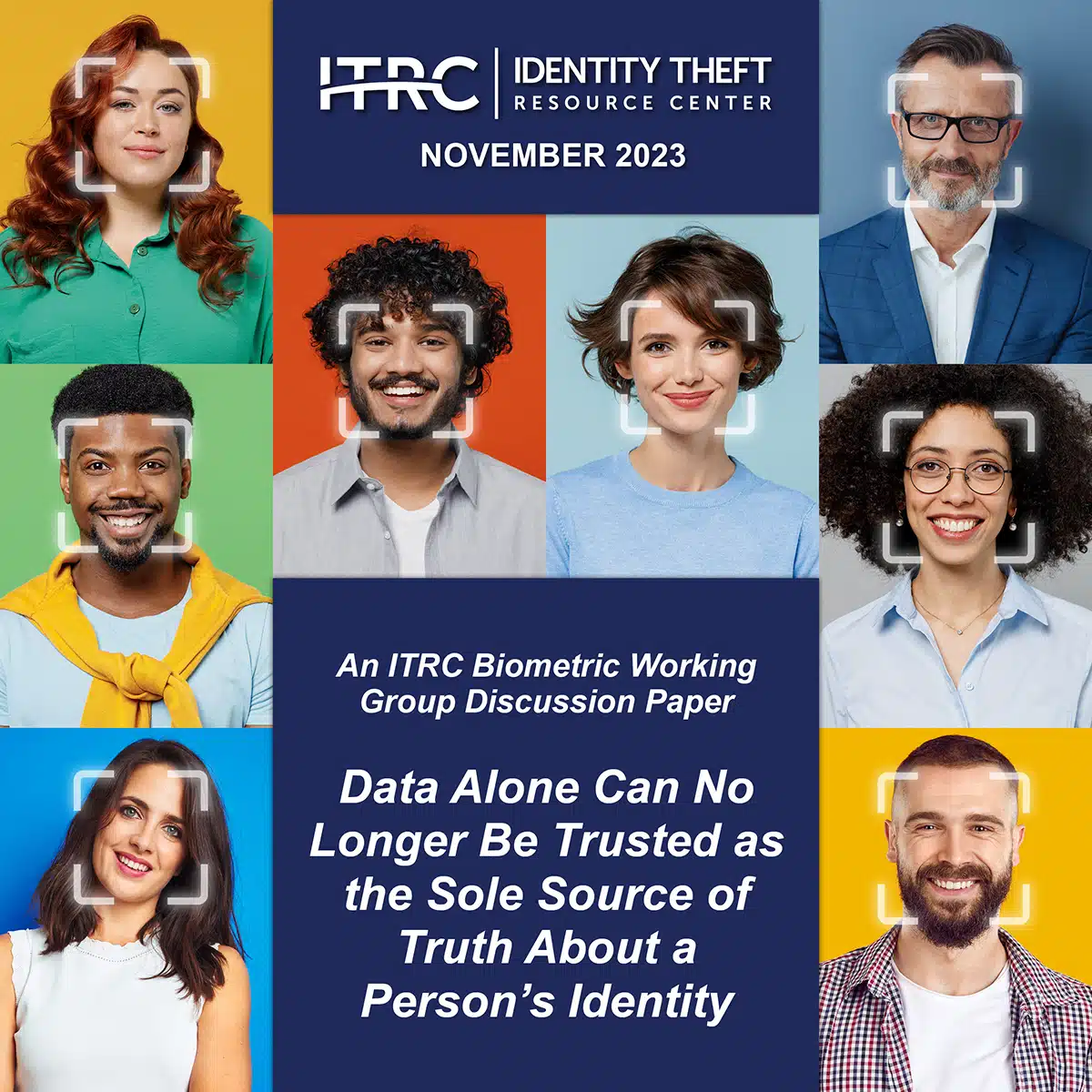Facial Verification – Not Recognition – Needed to Reduce Identity Crimes: Identity Theft Resource Center
Home Help Center Facial Verification – Not Recognition – Needed to Reduce Identity Crimes: Identity Theft Resource Center

Confusion between facial verification and facial recognition risks the rapid adoption needed to protect consumers and prevent identity crimes
SAN DIEGO, November 29, 2023 – Today, the Identity Theft Resource Center® (ITRC), a nationally recognized nonprofit organization established to support victims of identity crime, has published a discussion paper that looks at the need to improve the ways we verify identities in order to reduce the number of identity crime victims.
In 2020, trillions of dollars were pumped into the U.S. economy through enhanced government cash benefits, leading to an array of identity crimes that exposed issues in current identity verification processes. Recognizing that data could no longer be trusted as the sole source of truth about a person’s identity in most processes, the ITRC turned to a group of recognized policy, academic, technical and business experts, as well as victim advocates, to explore the use of biometrics. The ITRC’s Biometric Working Group (BWG) was tasked to explore practical solutions that will help prevent identity crimes in an equitable and unbiased manner while respecting privacy and ensuring data protection.
Some of the key findings from the BWG discussion paper include:
- There is a clear distinction between facial verification (also referred to as facial comparison), which is a consent-based process for proving a person is who they claim to be, and the controversial facial recognition tools used for surveillance and investigation without a person’s knowledge by government agencies.
- The use of a facial biometric as part of a comprehensive identity verification process could help ensure the authenticity of the applicant while lowering the overall value of stolen personal information used by bad actors. As a result, individuals will be at less risk of certain identity-related crimes.
- Organizations seeking to use facial verification tools should follow best practices, including storing data for a limited time, encrypting the data and not using the data for anything to which the data subject has not consented.
After reviewing the current landscape, the ITRC’s BWG concluded that biometrics, with proper safeguards and controls, represents the best chance for protecting the identities of individuals and improving the integrity of public and private sector processes.
DOWNLOAD THE DISCUSSION PAPER
“The question we should be asking ourselves is not if we adopt biometric ID verification, but how,” said Eva Velasquez, President and CEO of the Identity Theft Resource Center. “For decades, we have relied almost exclusively on personal information that has largely been compromised in data breaches to verify someone’s identity. If we continue to resist biometric ID verification, especially facial verification, consumers will remain at a higher risk of falling victim to identity criminals using stolen personal information.”
“What we have learned during the year is that there are safe and ethical ways to deploy facial verification that avoids the documented concerns about equity and bias with surveillance-related facial recognition,” Velasquez continued. “This discussion paper provides organizations with a guide to evaluate what is possible now and in the future as well as a resource for policymakers so they can avoid the hype and hysteria surrounding biometric technology.”
The ITRC’s BWG also recommends that, in addition to wider adoption of biometric ID verification tools, organizations must provide a “digital offramp,” a means for verifying a person’s identity without the use of biometrics, personal devices or remote access.
Consumers can receive free live victim support or guidance from a knowledgeable advisor by calling 888.400.5530 or visiting www.idtheftcenter.org to live chat.
About the ITRC Biometric Working Group
The ITRC Biometric Working Group was convened to discuss the practical, privacy and policy implications of the use of biometric identifiers in identity verification processes used by the public and private sectors. Subject matter experts who participated included:
John Breyault, National Consumers League/ITRC Board
Blair Cohen, AuthenticID/ITRC Board
Jamie Danker, Venable LLP
Jeremy Grant, Venable LLP & Better Identity Coalition (BIC)
Dr. David Maimon, Georgia State University
Zach Martin, Venable LLP
Linda Miller, Founder & CEO Audient Group, LLC
Drew Nicholson , Intellectual Technology Incorporated (ITI)
Dr. Stephanie Schuckers, Clarkson University
Stephen Smith, Intellectual Technology Incorporated (ITI)
Eva Velasquez, ITRC
Michael DiTurno, ITRC
About the Identity Theft Resource Center
Founded in 1999, the Identity Theft Resource Center® (ITRC) is a national nonprofit organization established to empower and guide consumers, victims, business and government to minimize risk and mitigate the impact of identity compromise and crime. Through public and private support, the ITRC provides no-cost victim assistance and consumer education through its website live chat idtheftcenter.org, and toll-free phone number 888.400.5530. The ITRC also equips consumers and businesses with information about recent data breaches through its data breach tracking tool, notified. The ITRC offers help to specific populations, including the deaf/hard of hearing and blind/low vision communities.
Media Contact
Identity Theft Resource Center
Alex Achten
Director of Communications & Media Relations
888.400.5530 Ext. 3611
[email protected]
How much information are you putting out there? It’s probably too much. To help you stop sharing Too Much Information, sign up for the In the Loop.
Get ID Theft News
Stay informed with alerts, newsletters, and notifications from the Identity Theft Resource Center

